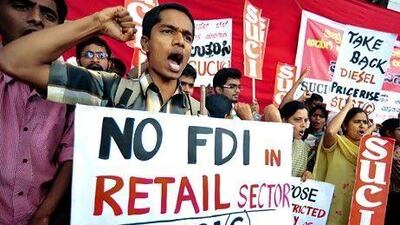Manmohan Singh's decision to bite the bullet on economic reforms is undoubtedly a positive step towards reviving India's economy.
However, there are mounting challenges the Indian prime minister and his government now face following the spate of reforms unleashed at the end of last week.
Late on Thursday, it emerged diesel prices were being hiked by 5 rupees per litre as the government reduced subsidies. The next day, as everyone was still digesting the news, the government announced it would open up its economy to 51 per cent foreign investment in multi-brand retail, as wellas allow foreign carriers to buy stakes of up to 49 per cent in Indian airlines.
In addition, the government revealed measures to boost investment into the power and broadcasting sectors as well as plans to sell minority stakes in four public-sector companies, including Oil India.
The government had been accused of dithering on important reforms that would help to turn around a slowdown in economic growth and salvage the country from becoming the first "fallen angel" among the developing Bric countries. The ratings agency Standard & Poor's this year warned India was at risk of having its investment status downgraded to junk. The agency cited "policy paralysis" as one of the main factors behind this warning.
In recent days the dithering finally came to an end. Fuel hikes will help to rein in India's ballooning fiscal deficit, while opening up the economy to foreign investment will only boost the country's growth, economists say.
But there are many who do not see it that way, with the decisions delayed largely because of their unpopularity in certain corners. Now, Mr Singh and his government will have to deal with the political backlash with which the bold moves are being met. He will have to hold his ground.
"If we have to go down, let us go down fighting," the prime minister has been quoted as saying as he decided on the measures.
Opposition parties have been screaming out for the government to roll back its decisions. Even its allies and supporting parties have opposed the reforms. There have been calls for a nationwide protest on Thursday to challenge the fuel hikes and foreign investment in retail. Some protesters have already taken to the streets in New Delhi and other cities. Mr Singh has defended the decisions, warning that without action, economic growth in India could slow to 5 per cent.
One of the main criticisms raised by opponents including the Bharatiya Janata Party (BJP) is the belief these decisions hurt the poor. The rise in diesel prices is expected to feed into soaring inflation and have a knock-on effect of driving up prices of other goods, including fruit and vegetables, because transport costs will rise.
The party is also arguing the wave of reforms were announced with the aim of detracting attention from the "Coalgate" corruption scandal over the sale of coalfields, the allegations of which have tainted Mr Singh's image.
The monsoon session of parliament was a washout, with valuable time and efforts focused on Coalgate, distracting leaders from making decisions on economic reforms.
In terms of foreign investment in multi-brand retail, which is expected to pave the way for giants such as Wal-Mart and Tesco to open supermarkets in India, there are widespread concerns the entry of such companies could kill off millions of "mom-and-pop" shops across the country.
India is a nation of small shopkeepers and farmers. But the BJP says India will turn into a nation of "sales boys and sales girls" in its demands to have the plans scrapped. Economists, however, laud the prospect of job creation and the lower prices when the retail sector opens up.
In the latest version of the reform, there is a caveat that the Indian states need to back the retail policy to implement it at home.
Mr Singh backed down once before on retail policy, announcing plans last November to open up the sector to foreign investment in multi-brand retail, only to put the plans on ice a few weeks later because they were shouted down by opponents.
To backtrack again would be an irreparable sign of weakness.

